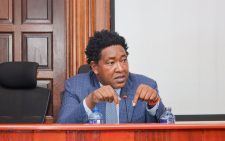Why Africa must leverage its ‘green minerals’ riches

Africa is rich in natural resources and the significance of this wealth has become even more pronounced amid the triple crises of climate change, biodiversity loss and pollution facing humanity and the planet.
The African continent is incredibly rich in “traditional” mineral resources, holding significant global reserves of metals like gold, diamond, platinum, cobalt. Nearly half of the world’s known deposits of gold and one-third of all minerals are in Africa.
Africa also possesses vast reserves of iron ore, copper, manganese, uranium and various industrial minerals, playing a crucial role in the continent’s economy and global supply chains.
Now the legacy mineral riches have been joined by another lucrative source of “green minerals” from the depths of the continent, which have evoked memories of the Scramble for Africa and the advent of colonialism.
Notably, this time around, the continent is politically liberated and emerging as an intellectual and economic giant. Africa is enjoying the advantage of a technological quantum leap buoyed by the green minerals’ potential to harness regional integration for trade and economic growth.
“Africa must move beyond raw mineral exports and build strong, integrated value chains and foster local beneficiation, job creation, and economic diversification. By leveraging its vast mineral wealth strategically, Africa can contribute to the global shift toward a sustainable and green future,” says African Union (AU) Commissioner for Economic Development, Trade, Tourism, Industry and Minerals Albert Muchanga.
Resource dependence
Mineral exports are a vital source of revenue for many African countries, a significant contributor to their economies, often forming a substantial portion of their export earnings and GDP. Mineral exports (fuel and non-fuel minerals) account for a substantial portion of exports.
Many African nations are classified as resource-dependent, largely relying on mineral exports for their economies. Out of 54 African countries, 42 are classified as resource-dependent, relying on non-fuel minerals, ores and metals.
The mining and extractive sector plays a critical role in driving economic growth and development by contributing to fiscal revenues, foreign currency reserves, and employment.
In geopolitics, Africa is a major player in the global market for various metals, holding significant shares of global reserves for commodities like gold, cobalt and platinum.
The growing demand for minerals used in clean energy technologies such as batteries and electric vehicles, presents significant opportunities for African nations with reserves of critical metals like lithium and cobalt.
Against the backdrop of Africa’s rich mineral wealth and geopolitical strategic value, the impacts of climate change loom large. Scientists have established that Africa contributes less than 5 per cent of the world’s greenhouse gas emissions, yet the continent is among the most vulnerable to the impacts of climate change.
Africa is also most affected by energy poverty, with over 40 per cent (600 million people) of the region’s population lacking access to electricity, while pressing challenges related to growth, development and industrialisation also face the continent.
There is thus a very strong interest in Africa to leverage the region’s mineral wealth to expand energy access and support jobs, economic growth and sustainable development through green industrialisation.
Africa holds vast reserves of critical minerals essential for the global transition to clean energy, but harnessing this potential for sustainable development requires careful management and strategic planning.
While Africa is disproportionately vulnerable to climate change impacts, it also possesses a unique opportunity to leverage its mineral wealth for economic growth and climate resilience and assert its role in the Global Green Transition.
The continent’s depth of wealth in minerals like cobalt, lithium, copper and manganese are crucial for technologies – electric vehicles, solar panels and wind turbines. Growing demand for “green minerals” is projected to increase significantly in the coming years, presenting a major opportunity for African countries.
By developing domestic value chains and beneficiation processes, Africa can move beyond exporting raw materials and create jobs, foster industrialisation, and generate wealth, amid the challenges and other considerations.
Mining activities can have significant environmental and social consequences, including deforestation, water pollution, and displacement of communities. Weak governance structures in the mining sector can lead to corruption, revenue leakages and inequitable distribution of benefits.
Continental roadmap
Africa therefore needs to carefully manage the environmental and social impacts of mining while ensuring that the mineral wealth translates into inclusive and sustainable development for its citizens.
To maximise the benefits, African countries need to prioritise local beneficiation, value addition, and the development of integrated value chains. The AU’s Africa Green Minerals Strategy aims to guide Africa’s approach to harnessing its mineral wealth for sustainable development, industrialisation and energy security.
It provides a roadmap for harnessing Africa’s mineral wealth to drive value addition at source, regional industrialisation and climate resilience. As the world accelerates toward net zero carbon emission, demand for Africa’s green minerals is set to soar.
Experts say improving transparency, accountability and regional frameworks is crucial for ensuring responsible mining practices. Developing infrastructure like railways, roads and processing facilities can facilitate the beneficiation of minerals.
Policies that encourage local participation in the mining value chain can create jobs and boost local economies, while environmental, social and governance (ESG) principles in all mining operations minimise negative impacts and maximise benefits.
By strategically managing its mineral resources and prioritising sustainable development, Africa can play a vital role in the global transition to a low-carbon future while also achieving its own development goals.
The continent’s critical minerals have come at a critical moment, unearthing Africa’s role in the artificial intelligence (AI) revolution, leveraging its critical minerals to gain a more equitable share of the AI boom.
“When discussing AI models, the focus falls on the software, programming and data used to push them forward. However, a critical component is often overlooked – the critical minerals essential for building the hardware that powers AI. These minerals don’t originate in the Silicon Valley tech companies; they are extracted from holes dug deep in the earth, often by vulnerable workers in challenging conditions,” says researcher Alberto Lemma.
He gives the example of the Kolwezi copper and cobalt mine in the Democratic Republic of the Congo (DRC), where Amnesty International has documented significant forced evictions to make room for mineral extraction and reports on labour exploitation.
“This highlights a stark reality: while Africa holds 30 per cent of the world’s critical mineral reserves essential for electronics and AI hardware, it captures only 10 per cent of the global revenue generated from these resources. There is a fundamental disparity at play but the time to redress, in favour of African countries, is now,” affirms Lemma.
The African continent is rich in minerals like cobalt, lithium and graphite – all essential for AI development. The DRC possesses the world’s largest cobalt reserves, making it a key player in the global supply chain.
Zimbabwe boasts significant lithium deposits, crucial for lithium-ion batteries. Madagascar and Mozambique have significant graphite deposits.
At this critical juncture, where AI is increasingly gaining traction, African nations must leverage one of their most important resources – access to these critical resources. In the geopolitics of energy minerals, Africa can lead the green energy transition.















